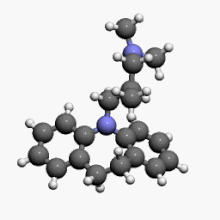Trimipramine
 |
|
 |
|
| Clinical data | |
|---|---|
| Trade names | Surmontil |
| AHFS/Drugs.com | Monograph |
| MedlinePlus | a602010 |
| License data |
|
| Pregnancy category |
|
| Routes of administration |
Oral, IM, IV |
| ATC code | |
| Legal status | |
| Legal status | |
| Pharmacokinetic data | |
| Bioavailability | 41% |
| Protein binding | 94.9% |
| Metabolism | Hepatic |
| Biological half-life | 23-24 hours |
| Excretion | Renal |
| Identifiers | |
|
|
| CAS Number | |
| PubChem CID | |
| IUPHAR/BPS | |
| DrugBank | |
| ChemSpider | |
| UNII | |
| KEGG | |
| ChEBI | |
| ChEMBL | |
| ECHA InfoCard | 100.010.917 |
| Chemical and physical data | |
| Formula | C20H26N2 |
| Molar mass | 294.434 g/mol |
| 3D model (Jmol) | |
|
|
|
|
Trimipramine (Surmontil, Rhotrimine, Stangyl) is a tricyclic antidepressant (TCA) with antipsychotic and sedative properties.
Trimipramine's primary use in medicine is in the treatment of major depressive disorder, especially where sedation is required due to its prominent sedative effects. Trimipramine also has some weak antipsychotic effects which are less pronounced than with the phenothiazine antipsychotic perazine.
Trimipramine is the only effective drug against insomnia known so far that does not alter the normal sleep architecture (there is evidence in medical journals that refute this last statement). In particular, it does not suppress REM sleep, and dreams are said to brighten during treatment.
Common adverse effects include:
Note: Bolded adverse effects are serious ones.
whereas adverse effects with an unknown incidence includes:
and rare adverse effects include:
Contraindications include:
Trimipramine should not be given with sympathomimetic agents such as adrenaline, ephedrine, isoprenaline, noradrenaline, phenylephrine and phenylpropanolamine.
Barbiturates may increase the rate of metabolism. Trimipramine should be administered with care in patients receiving therapy for hyperthyrodism.
Compared to other tricyclic antidepressants trimipramine is relatively safe in overdose, although it is more dangerous than the selective serotonin reuptake inhibitors (SSRIs) and serotonin-norepinephrine reuptake inhibitors (SNRIs) but less dangerous than bupropion in cases of overdose.
...
Wikipedia
